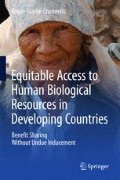Abstract
The aspiration to ensure access to human DNA without exploitation of research communities being a central theme of the book, this chapter explores meanings of the word exploitation from its everyday usage to its various interpretations as a philosophical concept. The most significant contributions from the literature are traversed, such as advantageous use of someone, or interaction stained by wrong, or gaining advantage at the expense of another. Legal approaches to exploitation are introduced, with substantive and procedural fairness as themes that are revisited throughout the book. Likewise, non-legal approaches are introduced such as Wertheimer’s taking unfair advantage, focus on consent as an indicator of fairness, and the Principle of Permissable Exploitation. Finally Mayer’s three forms of exploitation are chosen as providing clear guidance for the questions being examined. The three forms are firstly where exploiters do not benefit their victims at all (the free rider), secondly where they do not benefit them sufficiently (an unfair exchange), and thirdly where they do not benefit them authentically (an illegal or highly immoral transaction, e.g. the provision of heroin at reasonable prices). The chapter closes by explaining how Mayer’s last two classes will be used as yardsticks in subjecting the exchange of human DNA to scrutiny.
Access this chapter
Tax calculation will be finalised at checkout
Purchases are for personal use only
Notes
- 1.
[Online] Available at http://www.macmillandictionary.com.
- 2.
Carse and Little (2008) refer to marketplace norms, which denote a transaction as morally permissible as long as both parties are competent, fully informed and sufficiently instrumentally rational, and there is no deception, fraud, manipulation, threat, coercion or force.
References
Arnason, G., & van Niekerk, A. (2006). Undue fear of inducements in research in developing countries. Cambridge Quarterly of Healthcare Ethics, 18(2), 122–129.
Bigwood, R. (2003). Exploitative contracts. Oxford: Oxford University Press.
Brody, H. (2001). The other side of eden: Hunter-gatherers, farmers, and the shaping of the world. Canada: North Point Press.
Buchanan, A. (1979). Exploitation, alienation and injustice. Canadian Journal of Philosophy, 9, 138.
Carling, A. (1998). Exploitation. In Encyclopedia of applied ethics (Vol. 2). San Diego: Academic Press.
Carse, A. L., & Little, M. O. (2008). Exploitation and the Enterprise of Medical Research. In J. S. Hawkins & E. J. Emanuel (Eds.), Exploitation and developing countries: The ethics of clinical research (pp. 206–245). Princeton and Oxford: Princeton University Press.
Fried, C. (1978). Right and wrong. MA, Cambridge: Harvard University Press.
Guevara, C (1964). Speech delivered on March 25, 1964 at the plenary session of the United Nations Conference on Trade and Development (UNCTAD) [Online] Available in http://www.rcgfrfi.easynet.co.uk/ww/guevara/.
Hawkins, J., & Emanuel, E. J. (2008). Exploitation and developing countries: The ethics of clinical research. New Jersey: Princeton University Press.
Hayden, C. (2007). Taking as giving: Bioscience, exchange, and the politics of benefit sharing. Social Studies of Science, 37, 729–758.
Macklin, R. (2004). Double standards in medical research in developing countries. Cambridge: Cambridge University Press.
Mayer, R. (2007). What’s wrong with exploitation? Journal of Applied Philosophy, 24(2).
Schwartz, J. (1995). What’s wrong with exploitation? Noûs, 29, 159–164.
Skloot, R. (2010). The immortal life of henrietta lacks. New York: Crown Publishers.
Wertheimer, A. (1996). Exploitation. Princeton: Princeton University Press.
Wertheimer, A. (2008). Exploitation in Clinical Research. In J. S. Hawkins & E. J. Emanuel (Eds.), Exploitation and developing countries (pp. 63–104). Oxford: Princeton University Press.
Wood, A. (1995). Exploitation. Social Philosophy and Policy, 12, 150–151.
Author information
Authors and Affiliations
Corresponding author
Rights and permissions
Copyright information
© 2016 Springer International Publishing Switzerland
About this chapter
Cite this chapter
Chennells, R.S. (2016). Exploitation. In: Equitable Access to Human Biological Resources in Developing Countries. Springer, Cham. https://doi.org/10.1007/978-3-319-19725-8_2
Download citation
DOI: https://doi.org/10.1007/978-3-319-19725-8_2
Published:
Publisher Name: Springer, Cham
Print ISBN: 978-3-319-19724-1
Online ISBN: 978-3-319-19725-8
eBook Packages: MedicineMedicine (R0)

